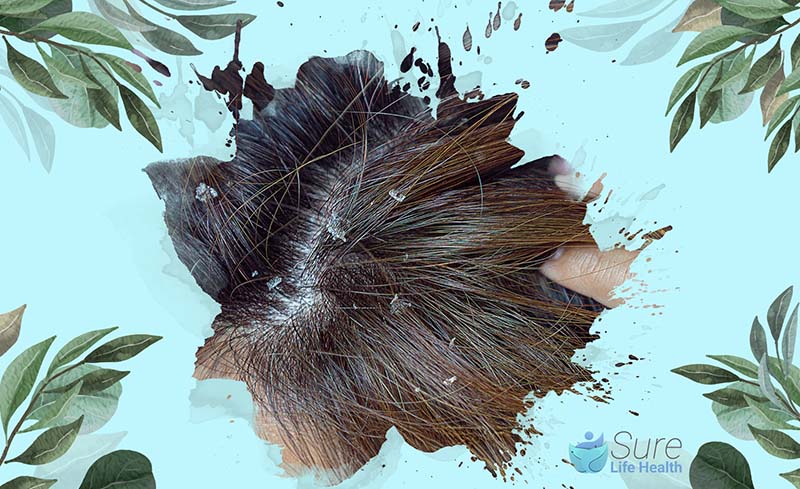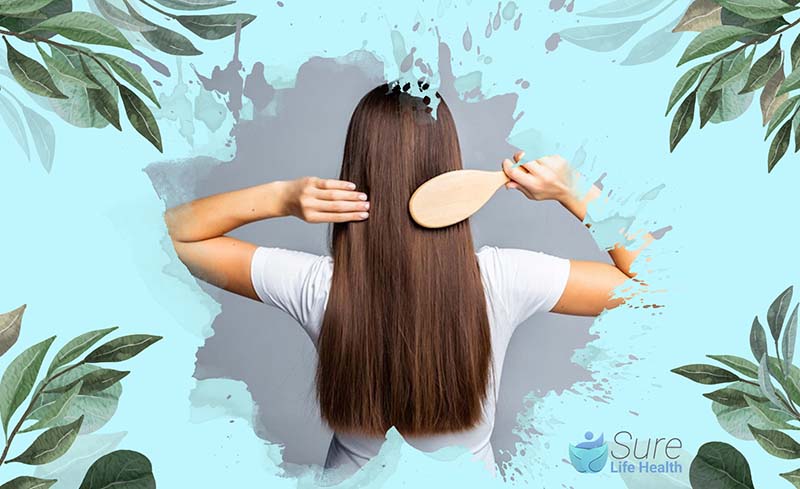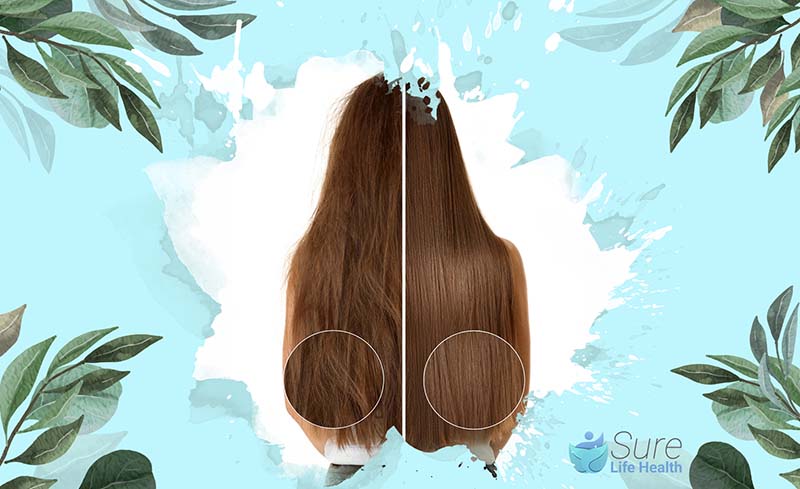People often say one man’s trash is another man’s treasure, and that’s certainly true for grapeseed oil. This remarkable oil, a byproduct of winemaking, is extracted from grape seeds that would otherwise be discarded.
But where does the treasure part come in? Beyond its culinary uses, grapeseed oil is a powerhouse in the beauty world, particularly for hair care.
Rich in antioxidants, this versatile oil provides deep moisture, enhances shine, and controls frizz, making it suitable for all hair types. It’s no wonder grapeseed oil is a key ingredient in a wide range of hair products, from conditioners and hair oils to styling treatments.
Is Grapeseed Oil Good for Hair?
Grapeseed oil isn’t just for cooking – it’s great for your hair care routine too! Extracted from grape seeds left after wine production, this oil is beneficial for your strands. Cosmetic chemist Manuela Marcheggiani highlights its rich composition, which includes polyunsaturated fatty acids, particularly linoleic acid, along with vitamin E, phenolic compounds, and antioxidants.
Linoleic acid is essential for maintaining your skin’s barrier function, keeping it hydrated and smooth. Vitamin E protects against environmental stressors, shielding your hair from oxidative damage. The phenolic compounds provide anti-inflammatory benefits, soothing irritated skin and scalp.
Grapeseed oil’s ability to moisturize, protect, and calm makes it a versatile addition to your hair care routine. Suitable for all hair types, it offers lightweight hydration and protection without weighing your hair down. Try grapeseed oil to give your hair the boost it deserves!

7 Benefits of Grapeseed Oil for Hair
Improving Blood Circulation
Massaging grapeseed oil into your scalp can enhance blood flow, delivering vital nutrients and oxygen to your hair roots, potentially supporting hair growth.
Fighting Dandruff and Scalp Buildup
Thanks to its anti-inflammatory properties, grapeseed oil can reduce scalp inflammation, lowering the risk of conditions like dandruff or scalp psoriasis.
It also naturally inhibits sebum production, reducing flakiness and dandruff.
Stimulating Hair Growth
Packed with flavonoids, vitamin E, and linoleic acid, grapeseed oil can stimulate hair growth when applied to the scalp.
Its essential fatty acids, antioxidants, and vitamins can improve scalp health and encourage new hair growth.

Strengthening Hair Roots
Grapeseed oil penetrates the hair shaft, reinforcing each strand from within.
This strengthens the hair roots, leading to stronger, healthier hair that is less susceptible to breakage.

Protection From Environmental Stressors
The antioxidants and fatty acids in grapeseed oil act as a shield against environmental damage such as pollution, heat, and UV radiation.
Integrating grapeseed oil into your hair care routine may reduce damage caused by these stressors, keeping your hair strong and healthy.

Enhancing Shine and Vibrancy
Grapeseed oil serves as a natural hair conditioner, imparting a healthy shine and vibrancy to your locks.
Its lightweight texture doesn’t weigh down your hair, making it perfect for daily use. Applying a few drops to damp hair after showering can boost shine and moisture.

Sealing in Moisture and Reducing Frizz
Grapeseed oil’s ability to lock moisture into the hair shaft can combat dryness and frizz, keeping your hair smooth, shiny, and well-hydrated. Simply adding a few drops to your hair can help maintain its moisture balance and minimize frizz.
Incorporating grapeseed oil into your hair care routine can offer a myriad of benefits, from promoting growth to enhancing shine and protecting against environmental damage. Give it a try to experience healthier, more vibrant hair!

Does Grape Seed Oil Cause Any Side Effects?
While grape seed oil offers numerous benefits, it’s important to be aware of potential side effects:
- Headaches: Some individuals may experience headaches when using grape seed oil on their hair and scalp.
- Dizziness and Nausea: In certain cases, grape seed oil can lead to feelings of dizziness and nausea.
- Allergic Reactions: If you’re allergic to grapes, grape seed oil may cause skin reactions such as redness, itchiness, or rash.
- Skin Irritation: When applied directly to open wounds or chapped skin, grape seed oil can cause irritation.
It’s essential to perform a patch test before using grape seed oil extensively, especially if you have known allergies or sensitivities. If you experience any adverse reactions, discontinue use immediately and consult with a healthcare professional.

How to Use Grapeseed Oil for Hair?
Grapeseed oil, easily accessible both online and in local stores, can be a beneficial addition to your hair care regimen. Our blog recommends the following methods for utilizing grapeseed oil effectively:
- Leave-in Treatment: Treat your hair and scalp once or twice weekly by applying a few drops of grapeseed oil. Allow it to penetrate for 20-30 minutes before washing your hair as usual.
- Moisturizing Boost: Enhance the moisturizing properties of your shampoo or conditioner by mixing in a small amount of grapeseed oil during your hair washing routine.
- Styling Aid: Combat dryness and frizz by applying a few drops of grapeseed oil to the lengths of your hair post-shower. This can help reduce frizz and enhance moisture retention.
Experiment with these methods to determine what best suits your hair type and preferences.
Notes:
- Quantity: Start with a small amount of grapeseed oil and adjust as needed based on your hair’s response.
- Consistency: Consistently incorporate grapeseed oil into your routine to observe long-term benefits.
- Scalp Massage: Consider gently massaging grapeseed oil into your scalp to promote circulation and nourish the hair follicles.
Conclusion
In summary, grapeseed oil is a true gem in hair care, offering shine and nurishment. For healthier, more radiant hair, try incorporating grapeseed oil into your routine and witness the amazing results.
We’d love to hear about your experiences – share your stories with us and join our community of hair care enthusiasts. If you’re wondering, “Is grapeseed oil good for hair?” the answer is a resounding yes. Be sure to check out more insightful blogs on hair care and wellness from SurelifeHealth as you continue your journey towards vibrant, beautiful hair.
Professor Gaye Cunnane, PhD, MB, FRCPI
As the Director of Health and Wellbeing at RCPI, Professor Gaye Cunnane is at the helm of initiatives aimed at enhancing the health and well-being of RCPI Trainers and Trainees. Her role extends beyond administration; she is also a respected clinical professor of rheumatology and a consultant rheumatologist at Trinity College Dublin (TCD) and St James’s Hospital. Prof. Cunnane’s medical journey began at TCD, where she graduated from medical school, and her path has been marked by both clinical and academic excellence.
After completing her basic clinical training in medicine, she embarked on PhD studies at University College Dublin and St Vincent’s University Hospital. Her research during this period was focused on prognostic markers in early inflammatory arthritis, a project that saw her collaborating with esteemed universities across Europe, including in Switzerland, The Netherlands, the UK, and Sweden.
Prof. Cunnane’s career took her to the University of California, San Francisco, where she spent three years delving into research on new treatments for lupus. Her academic prowess led her to the University of Leeds in 2001 as a senior lecturer, before returning to Ireland in 2003 to assume her current roles. She has also served as the National Specialty Director for Rheumatology training in Ireland, Programme Director for Basic Specialist Training with RCPI, and as a past President of the Irish Society for Rheumatology.
PUBLISHED ARTICLES
“Rheumatic disease differentiation using immunoglobulin G sugar printing by high-density electrophoresis”: Published in The Journal of Rheumatology, this study reflects her in-depth investigation into rheumatic diseases.
“Benefits of exercise in patients with rheumatoid arthritis: a randomized controlled trial”: This research work, highlighting the positive impact of exercise on rheumatoid arthritis, underscores Prof. Cunnane’s dedication to practical, patient-centered research.
Additionally, Prof. Cunnane has made notable contributions to the Annals of the Rheumatic Diseases, discussing early referral, diagnosis, and treatment of rheumatoid arthritis. She has also been involved in a study on the NCBI platform investigating exercise benefits in rheumatoid arthritis patients.
Professor Gaye Cunnane’s career is a testament to her commitment to improving patient outcomes in rheumatology through rigorous research, clinical excellence, and dedicated teaching. Her work continues to influence the field of rheumatology, both in Ireland and internationally.

